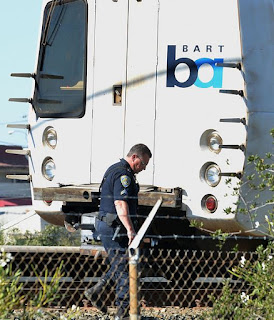California train agency fined $650,000 for 2 worker deaths
By PAUL ELIAS Associated Press
October 11, 2018
SAN FRANCISCO, CA —
Regulators fined the San Francisco Bay Area's transit agency $650,000 on Thursday for safety failures that led a commuter train to strike and kill two workers inspecting track five years ago during a union strike.
The California Public Utilities Commission also placed the Bay Area Rapid Transit agency on three years of probation. The commission said the fine would double if BART commits any safety violations during that period.
BART spokeswoman Alicia Trost said the agency was reviewing the decision, which nearly triples a $220,000 fine ordered by a judge last year. BART and staff members of the commission's Safety and Enforcement Division both appealed the judge's order to the five-member commission.
Commissioner Liane M. Randolph said regulators increased the fine because the safety failures were "egregious" and BART's response to the investigation was inadequate.
"BART's degree of wrongdoing, particularly the safety rule violations discussed above, are most troubling," Randolph wrote in the decision.
Randolph noted that BART was more than 16 months late in producing its accident report and its "corrective-action plan" was only two pages long and submitted four years after the accident.
Trost said BART has spent $2 million upgrading its safety barrier and plans an additional $4 million in improvements. She said the agency has overhauled its safety policies since the accident.
Laurence Daniels, 66, and Christopher Sheppard, 58, were killed in 2013 while inspecting a track east of San Francisco. At the time, the agency was scrambling to restore limited service during a workers strike.
The train that struck the workers was part of a training exercise to teach managers how to drive in case of a prolonged worker walkout. The strike ended after four days.
The judge found that a trainee with no direct supervision in the cab was driving the train. The driver slammed on the emergency brake and tried to hit the button to sound the train's horns but instead pressed a button that controls the doors.
The transit agency was using a safety procedure called "simple approval," in which track inspectors were responsible for their own safety and determined they could clear the track within 15 seconds of an approaching train.
BART has since eliminated that policy. BART trains are now required to stop if a worker is within 6 feet of the track. BART says it has improved communications between drivers, track inspectors and the control center.
The workers had their backs to the train when they were struck in violation of agency safety rules. One member of inspection crews is always supposed to be watching for trains.
The California Occupational Safety and Health Administration fined BART $210,000 in 2014.
In addition, BART has paid the family of Daniels $300,000 to settle a wrongful-death lawsuit. BART said Sheppard's family settled a worker's compensation claim, but Trost said she didn't know the amount paid.
======================================
NTSB issues safety recommendations following BART workers´ deaths
KCBA News
December 19, 2013
The National Transportation Safety Board Thursday issued “urgent” safety recommendations to protect rail workers in the wake of the on-the-job deaths of two BART track workers in Contra Costa County two months ago.
The recommendations arose from the NTSB’s ongoing investigation into the deaths of 58-year-old Hayward man Christopher Sheppard and 66-year-old Laurence Daniels of Fair Oaks, who were struck and killed by a BART train on Oct. 19 while inspecting a dip in the tracks between the Walnut Creek and Pleasant Hill BART stations.
At the time of their deaths, BART was using a controversial safety procedure known as “simple approval,” in which track employees were responsible for their own safety and required workers to clear the track in 15 seconds if a train approached.
BART has since eliminated the practice.
Following that revelation, the NTSB is urging “redundant” safety measures for rail workers, such as implementing a safety monitoring system known as positive train control, secondary warning devices or the use of a shunt that workers attach to rails to send a stop signal to approaching trains, according to a statement from the safety board.
The NTSB today also urged Federal Transit Administrator Peter Rogoff to require transit agencies to review safety procedures and eliminate practices that rely solely on the track worker to protect themselves from an oncoming train.
“Having redundant protection measures in place for track workers is not only a best practice but common sense,” NTSB chairman Deborah Hersman said. “A positive safety culture is not a solo act — everyone needs to look out for each other.”
The letter to Rogoff also cites other track worker deaths investigated by the NTSB in recent years, including fatal incidents in the Washington, D.C., New York and Boston areas.
The investigation into the deaths of Daniels and Sheppard is ongoing and the NTSB has not yet determined the accident’s probable cause.




